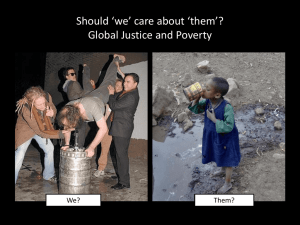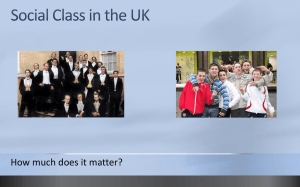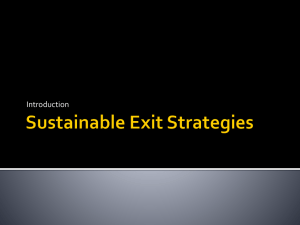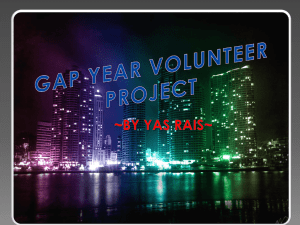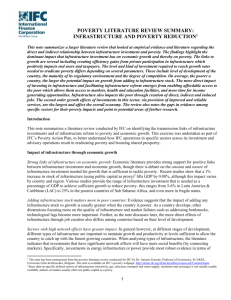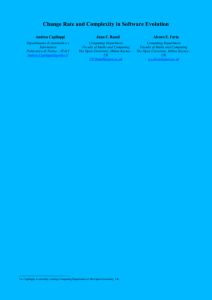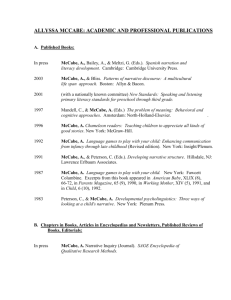social networks, ethnicity and poverty (PDF)
advertisement
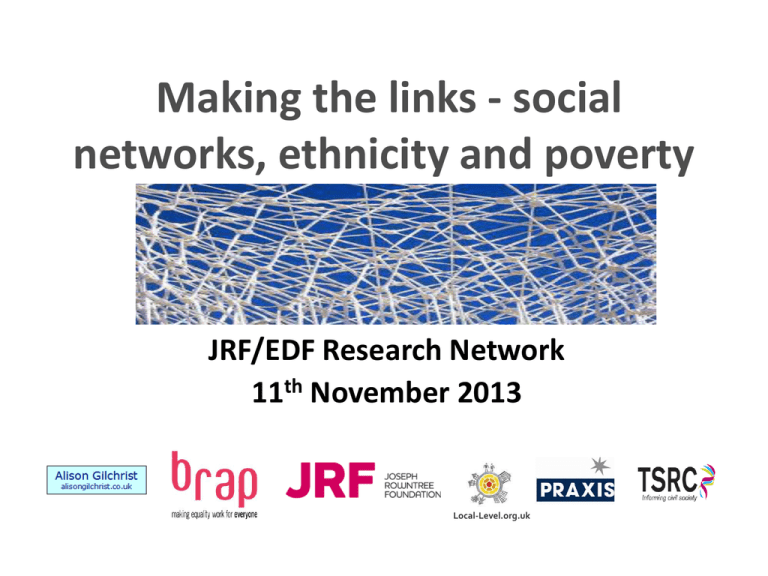
Making the links - social networks, ethnicity and poverty JRF/EDF Research Network 11th November 2013 Local-Level.org.uk Purpose of research project To investigate the links between social networks, ethnicity and poverty • How are networks established and maintained? • How do they affect people’s experience of poverty? • How do people use networks to move out of poverty ? • What other factors come into play? – education, affordable credit, housing, cultures and racial discrimination? Definitions • Poverty: having insufficient income and assets to fully participate in the norms of social and economic life • Ethnicity: broadly defined – race, culture, faith, origin/nationality, heritage…. • Social networks: the connections and interactions with others that support participation, cooperation, trust, social identity and community action • Social capital: ‘Networks together with shared norms, values that facilitate co-operation within and between groups’ (OECD) Research methods • Birmingham, Liverpool and Cumbria • Recruitment and training of 8 community researchers • 91 interviews with community members • 28 agency interviews • 4 scoping meetings with communities • 3 social media workshops • Observation sessions and visits • Literature review • 3 community feedback workshops and 1 policy seminar How people benefit from networks • • • • • • • • Emergency help Finding jobs, recruiting staff Getting accommodation Sharing children’s clothes, toys Access to affordable food Short-term loans Skills exchange – brokering and bartering Emotional support/comfort • Business promotion • Supply chains and potential markets • Access to expert advice and trades people (cheap or free) • Savings and loans for investment • Role models and mentoring • Help with interpretation of official documents Barriers and limitations • • • • • • • • • Social and institutional biases Racism; access to influential networks Xenophobia – feeling rebuffed or uncomfortable Language – vitality of English – and legal status Community, individual disadvantages Cost of networking (travel, gifts, socialising) Lack of time and energy – shifts, childcare, etc. Lack of confidence, self esteem Tendency to stay within own community – lack of access to well-paid jobs and good opportunities • Peer and family pressures, family responsibilities • Family ties cost money – dowries, remittances, visits Motivation and methods for networking • Strategies for finding the ‘right’ (useful) people • Being pro-active in keeping networks open and growing • Maintaining profile and credibility • Getting and checking reliable information • Providing a comfort zone, a ‘safe place’ • Enjoyment and affection Different values and expectations • Individualist o Entrepreneurial approach o Not waiting for things to happen o Self-help o Self-sufficiency o Keep other community members at a distance o Localised reciprocity • Collectivist o Orientation towards family and community o Expectation of automatic help in times of hardship o Informal systems for lending and borrowing money o Religious duties o Strategy for survival in harsh conditions Gender and generational differences • Impact of having children (but children as ‘assets to invest in’) • Cost of childcare/other care responsibilities • Cultural restrictions on women • Expectations change across generations and waves of ‘settlement’ • Access to (and familiarity with) information technology Rural context • Scattered BME populations: isolation, stress • Lack of ‘critical mass’ for organising ethnic specific community activities • Predominance of (small) multi-ethnic groups • Costs of travel to networking events • Poor access to broadband • Low pay, low aspirations for some • People tend to stay close to families Social media and the internet • Increasing use of online information and applications • Dedicated information and advice websites • Facebook with pages for private and ‘ethnic’ community networking • Twitter, email lists, Skype, QQ , Nasra Klasa, Facetime, YouTube • E-bay and online trading – Made in Cumbria, R&J store – Filipino goods • Age, class and network awareness • Digital disadvantage (rather than a clear ‘digital divide’) • Language barriers Agency perspectives • Importance of o o o o o o o o o One to one advice (benefits, business etc) Trust, reliability and ‘reach’ Access to affordable financial products Financial literacy education (money management/debt and savings) Education (but NB parental attitudes) Pre-network ‘mentoring’ Access to ‘vertical’ networks ‘Outwith’ immediate community networks The cuts as ‘network disruption’ Main findings • Importance of voluntary, community and faith groups • The complexity of negotiating systems and the culture of those systems • Links between networks and informal employment processes: ‘like with like’ networks can mean access to (low paid) employment • Inclusive and exclusive aspects of networks • Networks mitigate poverty but are not the only (or most important?) factor in moving out of poverty • Other factors – access to funds and assets, education, language skills, discrimination, fiscal policy, impact of welfare reform • Agencies/service providers do not systematically ‘use’ peoples networks in the advice/support process Key issues • Stereotypes of communities: independent and successful… dependent and unsuccessful • Cultural characteristics of networks: ethnic, class or personality differences and family histories • Networks in context: structure of labour market, fiscal and related policies • Deep versus broad networks (bonding and bridging capital) • Impact of ‘network disruption’: divorce, loss of long term employment/workplace; moving home • Utility and/or trust? Reliability and emotion/commitment in network • Transaction costs and benefits of network membership • In work poverty Recommendations • Access to face to face advice • ESOL: addressing language barriers and space for cross-cultural networking • Promoting digital fluency: social media use that is ‘not only social’ • Volunteer opportunities as a way into employment • Mentoring and peer support • Role of community based organisations: commissioning for ‘social value’ • Opportunities for developing ‘bridging’ networks Questions • What role can social networks play in helping people move out of poverty? • How can people be supported to make more use of their networks to improve their situations? • Who needs to act to help this to happen, and what do they need to do? Community and voluntary sector groups Employment services: Jobcentre Plus, Work Programme providers, local authority services, private and voluntary sector services Others? Thank you! For further information or discussion please contact Angus McCabe • a.j.mccabe@bham.ac.uk • 0121 415 8561 Research Team • Angus McCabe Third Sector Research Centre • Alison Gilchrist Independent Consultant • Asif Afridi BRAP • Paul Kyprianou Praxis CIC • Kevin Harris Local Level





